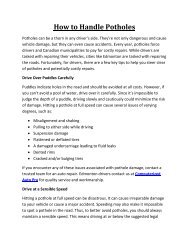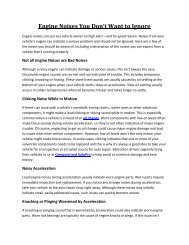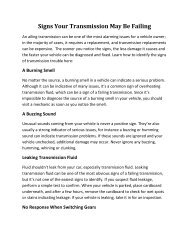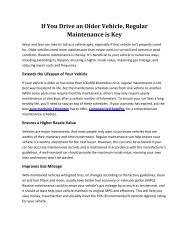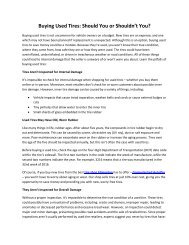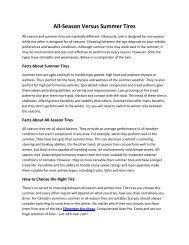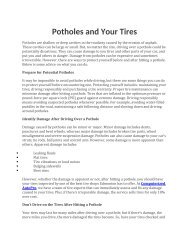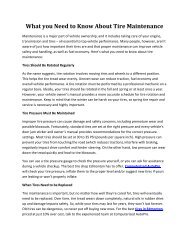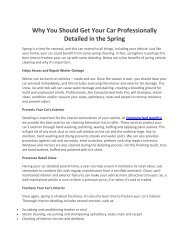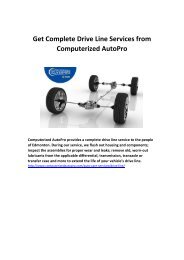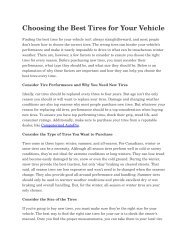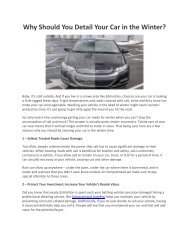Now’s the Time for Spring Car Maintenance
Here are the tips for early spring maintenance in order to minimize damages and ensure that your vehicle will perform well throughout the whole spring.
Here are the tips for early spring maintenance in order to minimize damages and ensure that your vehicle will perform well throughout the whole spring.
- No tags were found...
Create successful ePaper yourself
Turn your PDF publications into a flip-book with our unique Google optimized e-Paper software.
<strong>Now’s</strong> <strong>the</strong> <strong>Time</strong> <strong>for</strong> <strong>Spring</strong> <strong>Car</strong> <strong>Maintenance</strong><br />
Winter wea<strong>the</strong>r is particularly harsh on vehicles. In fact, icy roads and cold temperatures are<br />
top facilitators of vehicle damage and wear and tear. Consistently harsh winters make this even<br />
worse <strong>for</strong> Canadian car owners. To minimize damages and properly address wear and tear, your<br />
vehicle should be inspected once <strong>the</strong> winter ends, or every spring. Early spring maintenance is<br />
essential to ensuring your vehicle per<strong>for</strong>ms well throughout <strong>the</strong> spring and summer. This<br />
maintenance includes an inspection of several vehicle components, such as: <strong>the</strong> filters, <strong>the</strong><br />
tires, <strong>the</strong> fluids, and <strong>the</strong> belts and hoses.<br />
Inspect or Change <strong>the</strong> Filters<br />
A vehicle has several filters that must be periodically inspected and replaced to heighten safety<br />
and longevity. The most important filters to have checked and possibly replaced, include <strong>the</strong><br />
cabin air filter, engine air filter, fuel filter, and oil filter. Cabin air, engine air, and fuel filters<br />
should be inspected <strong>for</strong> clogging and damage and replaced as necessary. The oil and oil filter<br />
should be changed as recommended by your vehicle’s manufacturer. Changing your oil and oil<br />
filter at regular intervals will prevent engine problems and keep your vehicle’s fuel<br />
consumption as low as possible.<br />
Inspect <strong>the</strong> Tires<br />
Tires are <strong>the</strong> only part of <strong>the</strong> car that have contact with <strong>the</strong> road. This makes <strong>the</strong>m subject to<br />
greater wear and tear than o<strong>the</strong>r vehicle components. Thus, tire maintenance is essential to<br />
good vehicle health and per<strong>for</strong>mance. During <strong>the</strong> spring checkup, make sure your tires are<br />
checked <strong>for</strong> optimal pressure, damage on <strong>the</strong> sidewalls and more, and uneven wear on <strong>the</strong> tire<br />
tread. Damaged or worn tires should be replaced. On <strong>the</strong> o<strong>the</strong>r hand, normal wear tires should<br />
simply be rotated.<br />
Check <strong>the</strong> Fluids<br />
Coolant and fluids in <strong>the</strong> brakes, power steering, windshield wipers, and transmission should be<br />
checked as often as <strong>the</strong> oil and oil filter are checked. Low fluids should simply be topped off or<br />
flushed and replaced. However, since brake, coolant, and power steering systems are closed,<br />
low fluid levels may be caused by a leak. If you suspect one or more of <strong>the</strong>se systems is leaking,<br />
contact an auto repair shop like Computerized Auto Pro <strong>for</strong> trusted Edmonton and Sherwood<br />
Park auto repair services. Also, don’t <strong>for</strong>get to have <strong>the</strong> wiper blades checked <strong>for</strong> tears and<br />
cracks when <strong>the</strong> wiper fluid is checked. For safety, broken blades must be replaced.<br />
Inspect <strong>the</strong> Belts and Hoses
A car’s belts and hoses are rubber, and un<strong>for</strong>tunately, <strong>the</strong> cold wea<strong>the</strong>r can damage and/or<br />
harden rubber structures. On a vehicle, hardened rubber components can quickly soften,<br />
creating more problems or masking winter freezing. So, in <strong>the</strong> spring, belts and hoses should be<br />
checked <strong>for</strong> hardening and softening, as well as issues caused by this activity. Hardening can<br />
cause your belts and/or hoses to blister or develop leaks or cracks. It can also cause your belts<br />
to fray, loosen, or glaze. Damaged belts and/or hoses must be replaced along with <strong>the</strong>ir pulleys<br />
and tensioner.<br />
Book a spring maintenance checkup at Computerized AutoPro and address any damage done<br />
by winter driving. Call us today!




